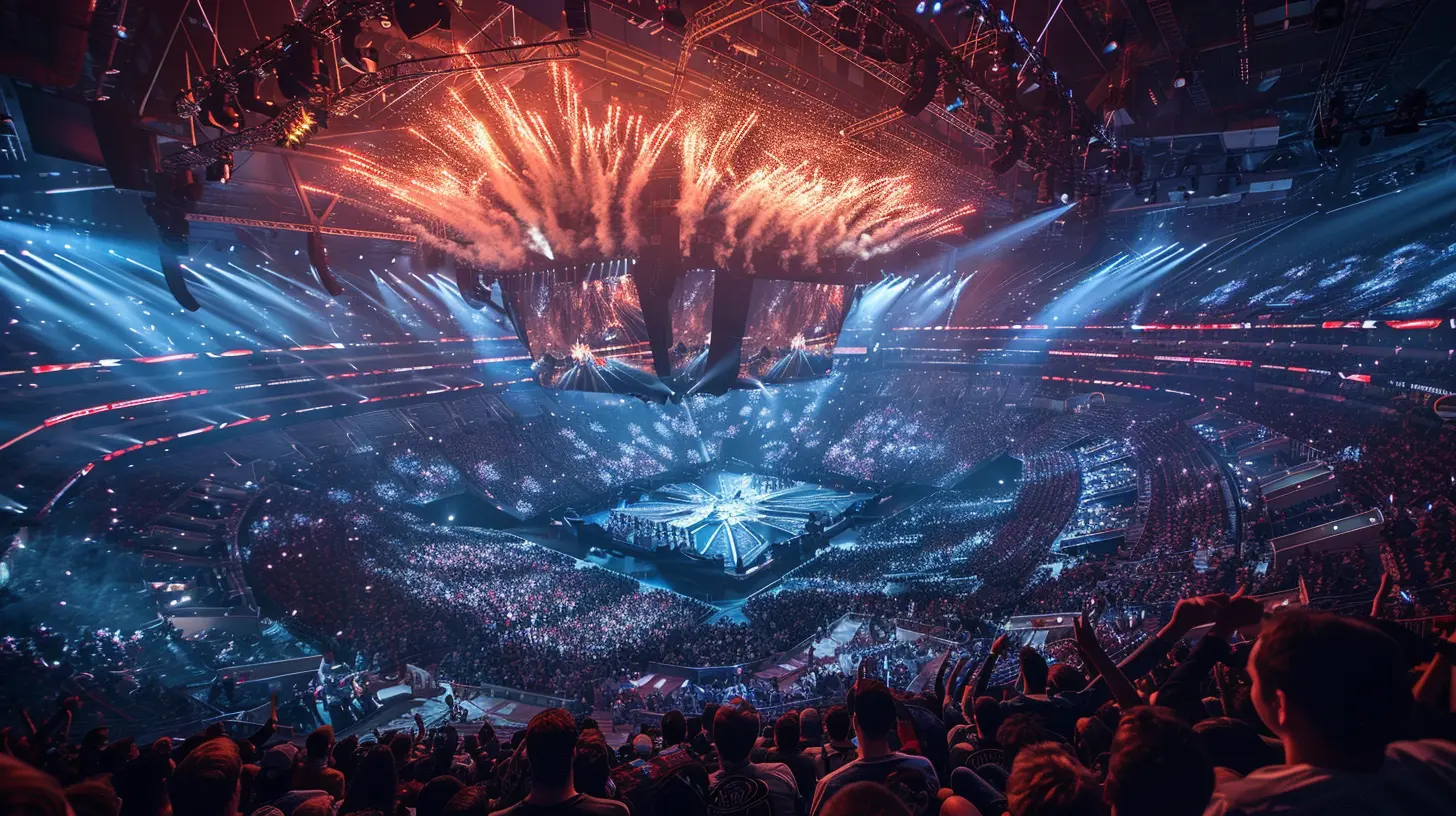Role of Esports in Popularizing Competitive Multiplayer Titles
8 May 2025
Gaming has always been a way for people to come together, whether it’s a split-screen session with friends on the couch or matching up with strangers in an online lobby. But in the last decade, something extraordinary has happened. Gaming leveled up—big time. Esports, or competitive video gaming, has gone from being a niche hobby to a global phenomenon. And you know what's fascinating? This meteoric rise of esports has played a huge role in making competitive multiplayer titles some of the most popular and profit-generating games in the industry today.
In this article, we’re diving deep into how esports has been the secret sauce behind the rise of competitive multiplayer games. So, grab a snack, and let’s break it down!
Esports: The Perfect Marriage of Competition and Entertainment
Let’s start with the basics: Why is esports such a big deal? Think about traditional sports for a sec—people love watching football, basketball, or tennis because there’s drama, skill, strategy, and the thrill of competition. Esports taps into all these emotions but brings them into the digital age. Instead of a physical field or court, the “arena” is a virtual battleground. And guess what? It’s just as electrifying.Games like League of Legends, Counter-Strike: Global Offensive (CS:GO), and Fortnite thrive in this ecosystem because they were practically built for it. They combine fast-paced action and deep strategy, making them perfect for both players and spectators. It's no wonder esports tournaments now fill arenas and break streaming records worldwide.
Competitive Multiplayer Titles and Their Esports Connection
What makes a competitive multiplayer game successful? Sure, gameplay mechanics, graphics, and community support are important, but esports has proven to be a game-changer. Titles like DOTA 2, Valorant, and Call of Duty owe much of their popularity to their thriving esports scenes.Why? Because esports creates an endless feedback loop:
1. Esports Drives Visibility
When a game has a huge esports event, whether it’s the International or the League of Legends World Championship, millions of viewers tune in. Suddenly, people who’ve never played the game want to check it out. And just like that, you’ve got new players diving into the competitive scene.
2. Game Developers Double Down
Developers know that esports can drive player interest, so they make their games esports-ready. This often means balancing the game for competition, organizing tournaments, and listening to feedback from pro players to keep the gameplay fair and engaging.
3. Player Aspiration
Let’s be honest—who hasn’t fantasized about becoming a pro gamer at least once? Watching esports stars like Faker or s1mple dominate their respective games inspires millions of players to improve their skills. This competitive mindset keeps the player base engaged long-term.
The Role of Streaming Platforms in the Boom
Now, you can’t talk about esports without giving a big shoutout to streaming platforms like Twitch, YouTube Gaming, and even Facebook Gaming. These platforms have taken esports from something you’d need to attend in person to a global, on-demand spectacle.Let me paint a picture: Imagine you’re scrolling through Twitch, and you stumble upon a live CS:GO match. The crowd is roaring (virtually, of course), the commentators are hyping up every headshot, and the sheer tension of the game is giving you goosebumps. Five minutes later, you're hooked—and you've probably just downloaded CS:GO to see what all the fuss is about.
Streaming platforms have become the go-to places for discovering games, learning new strategies, and being a part of the larger gaming community. They’re more than just outlets for content; they’re the heartbeat of esports fandom.
Esports as a Marketing Machine
Here's a little secret: Esports doubles as a giant marketing tool for competitive multiplayer titles. Think about the insane buzz that follows events like The International or the Fortnite World Cup. These tournaments generate headlines, social media trends, and jaw-dropping prize pools. And what happens when millions of people are talking about a game? You’ve got yourself a viral hit.But it doesn’t stop there. Big-name sponsors like Coca-Cola, Intel, and Mercedes-Benz invest in these events, adding a layer of mainstream credibility. This transforms esports from "just video games" to a legitimate entertainment platform. Competitive multiplayer games ride this wave straight into the spotlight.
Community Culture: The Glue That Holds It All Together
Let’s not forget one of the most crucial aspects of esports: the community. Esports fans are some of the most passionate, dedicated, and, dare I say, rowdy (in the best way) groups on the planet. They don’t just watch games—they live and breathe them. They create memes, share strategies, and build friendships (and rivalries) that span the globe.Games like Overwatch or Rocket League succeed not just because of their esports appeal but because their communities are so active. When a game fosters a tight-knit player base and integrates esports into its core identity, it’s a recipe for long-term success.
Bridging the Gap Between Casual and Hardcore Players
Another reason esports has been so impactful? It bridges the gap between casual players and hardcore competitors. Let’s face it—most of us aren’t going pro anytime soon (sorry to break it to you!). But esports gives us a chance to enjoy competitive gaming from the sidelines.Think of it like this: Even if you can’t dunk like LeBron James, you can still watch the NBA Finals and feel inspired. Esports does the same thing for gamers. Watching a Valorant pro pull off an insane clutch or a PUBG team out-strategize their opponents makes you want to jump into a game and try it yourself. It's an aspirational experience, and this has played a massive role in the popularity of competitive multiplayer titles.
The Snowball Effect: Why Competitive Multiplayer Games Are Here to Stay
Here’s the thing about competitive multiplayer games—they grow through a snowball effect, and esports accelerates that process. The more people watch esports, the more they play the games. The more they play, the more invested they become. And when players are invested, they spend money on in-game skins, battle passes, and other content. This revenue, in turn, goes back into funding the esports ecosystem. It’s a virtuous cycle, and it’s not slowing down anytime soon.What's Next for Esports and Multiplayer Gaming?
If the past few years are anything to go by, the future of esports and competitive multiplayer games looks ridiculously bright. As technology evolves, we’re likely to see even more immersive experiences. Virtual reality (VR) and augmented reality (AR) could open up entirely new dimensions for esports. Imagine watching a Fortnite tournament where you feel like you’re standing inside the Battle Royale map. Sounds crazy, right? But it’s closer than you think.Plus, with traditional sports leagues like the NBA and NFL investing in their own esports divisions, the lines between gaming and mainstream entertainment are blurring more than ever. One day, esports might just be as common as Sunday football.
Wrapping It Up
At the end of the day, there’s no denying that esports has had a massive impact on the popularity of competitive multiplayer games. It’s turned games into cultural phenomena, created communities that span the globe, and inspired millions of players to up their game. Whether you’re a casual gamer, a die-hard fan, or someone who just loves the thrill of competition, esports has something for everyone.So, next time someone dismisses gaming as "just a hobby," show them a clip of a packed arena during a League of Legends final or the jaw-dropping plays from a Call of Duty match. Competitive multiplayer gaming isn't just popular—it’s a full-blown revolution.
all images in this post were generated using AI tools
Category:
Multiplayer GamesAuthor:

Brianna Reyes
Discussion
rate this article
3 comments
Delta McKellar
Esports significantly enhances the visibility and appeal of competitive multiplayer titles, fostering community engagement, driving innovation, and creating lucrative opportunities for developers and players alike.
May 25, 2025 at 5:12 AM

Brianna Reyes
Absolutely! Esports plays a pivotal role in elevating competitive multiplayer games, boosting community engagement and driving innovation while offering exciting opportunities for both developers and players.
Tate Hardy
Esports has transformed the gaming landscape, yet hidden depths remain. What unseen forces shape its rise? As competitive multiplayer titles flourish, are we merely spectators, or are we part of a larger game yet to unfold?
May 12, 2025 at 2:52 PM

Brianna Reyes
Esports has indeed reshaped gaming, driven by community engagement, technological advancements, and evolving viewer experiences. We are not just spectators; our involvement as players and fans is crucial to the ongoing evolution of competitive multiplayer gaming.
Xander Horne
Fascinating to see how esports have transformed competitive gaming! It's intriguing to consider the impacts on player communities and game design. How do you think this trend will evolve in the coming years?
May 10, 2025 at 3:10 PM

Brianna Reyes
Thank you for your insights! I believe esports will continue to shape competitive gaming by fostering community engagement, influencing game design for better spectator experiences, and expanding accessibility, thus driving further growth in the industry.



